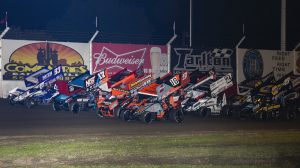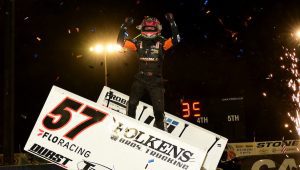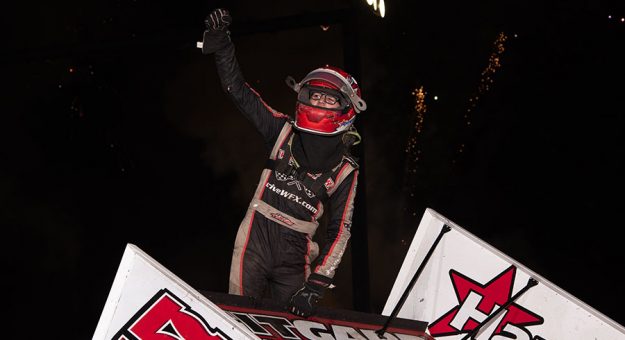TULARE, Calif. — In 1994, Dave Pusateri, the owner of Trophy City in San Jose Calif., came up with the idea for a race that featured a main event that was fully inverted, putting the fastest cars at the rear for a passing filled race.
The event was called the Trophy Cup and its remarkable history continues with the 28th annual race Oct. 20-22 at Thunderbowl Raceway.
It is a winged 360 sprint car show that draws attention to the West Coast from across the country. The Cup reaches a dramatic conclusion due to the final night main that puts the highest point cars close to the rear of the 24-car field.
From qualifying on the first two nights to heat races and mains, drivers earn points and the highest total after the racing ends wins the Trophy Cup.
There are two parts to the purse money, some is paid to drivers based on race finishes and the remainder is used to pay the top 24 cars in the point tally.

Over the years the format has been adjusted. To make qualifying more consistently fair, the drivers are split into groups A and B. Each group has its own fastest qualifier so two drivers will earn 150 points for fast time. Heat races are within each group, i.e., the A group has their own heats and likewise with B group. Once main events start, the groups are now combined for determining lineups, based on heat finishes and point totals.
On Friday B group will qualify first and the order of cars within each group will be reversed. The format mirrors Thursday action and, once completed, drivers will use their higher point total from the first two nights to carry into Saturday. A driver may have a tough night on Thursday but gets another chance the next night. Saturday will not have qualifying but heats and mains, culminating with the 50-lap, invert 20 main event.
The Trophy Cup has always been a cooperative effort among businesses, the host track, fans, and all the volunteers that shape the Trophy Cup organization.
San Jose Speedway was the host track until closing in 1999 and the inaugural victory went to Ronnie Day. A one-day format in its early years, two mains were raced and Day won the first one and started next to last as a result of his point total in the finale. Kevin Pylant and Brent Kaeding won the next two years.
The first three years the show featured winged 410 sprints. Concerns over car count prompted the change to the 360 engine and the move to a two-day format allowed teams to not have to race two mains in one night.
In 1997, Mark Kinser took the treasure back to Oolitic, Ind. Brent Kaeding won his second title in 1998 and the following year was the last for San Jose Speedway as the track closed and an era in racing concluded with another BK title. Terry McCarl won the Saturday main, the last race ever on San Jose’s third-mile oval.
Watsonville Speedway hosted the Cup in 2000 and Tommy Tarlton was the champion and the following year the Cup was held at Kings Speedway in Hanford and Craig Stidham won the championship.
In 2002, it was Tim Kaeding winning his first Cup title and the 2003 version was one of the closest in Cup history and it was a last lap, last-turn pass that made Steve Kent the champion by the slimmest of margins.
The 2004 Cup was the last at Kings as the track closed in August the following year, at least temporarily. Ronnie Day was again so close to a title, winning the Saturday main from 18th, but coming up five points short of Jac Haudenschild’s total.
Thunderbowl, about a 30 minute drive from Kings Speedway, took over the 2005 version on short notice after Kings closed. Brent Kaeding won the title the first year the Cup was in Tulare and his son, Tim, won the following year.
Jason Meyers won the event the next year by a large margin after a 20th to third run in the Saturday finale.
In 2008, Brad Sweet went from 24th to third on Saturday to edge Sammy Swindell for the championship and a year later TK won his third title, the seventh for the Kaeding racing family. Kaeding was also the one and only driver to win the Saturday main from 24th starting spot, using the Thunderbowl cushion and sometimes the wall to accomplish the feat.
In 2010, it was finally time for Jonathan Allard to enjoy victory at the Trophy Cup. Often in position to claim the title as Saturday’s main went green, problems seemed to follow Allard to deny a Cup crown. The 2011 finale produced a great duel between Haudenschild and Allard with Haud prevailing.

Jason Meyers won another title in 2012 with a 23rd to second run on Saturday and the following year produced a finish that is still talked about.
Saturday’s main event finish was the wildest in the first 20 years of Cup action. Last-lap drama exceeded any prior script when Kyle Larson and Brad Sweet raced for the win with last-turn contact between the pair leading to Sweet flipping and Larson slamming the turn-four wall.
Larson limped to the line in his battered ride, shedding parts along the way, as the race was allowed to finish. Larson, 23rd starting, won the main and Cup title to cap a memorable night.
2014 was the first for the three-day format and Willie Croft won the title. The following year rain ended Thursday racing during qualifying so two shows were run on Friday. Bud Kaeding was the champion for the unusual two-day format
In 2016, the format was adjusted to eight heat races on the first two nights with the winner and high point car making the A main. Those 16 cars are supplemented by the top four finishers from a pair of B mains to create the usual 24-car field.
The youngest main event winner ever at the Cup came on Friday night when Buddy Kofoid, age 14, triumphed. Shane Golobic won his first of two titles in a row with a consistent performance. When he won the title the following year, he joined Brent Kaeding as the only drivers to win back to back years.
Haudenschild won his third title the next year at age 60 and the following year something never considered possible happened when Rico Abreu won all three main events starting in 5th, 10th and 17th.
The following year there was no event, but when resuming in 2021 another event record was set when Buddy Kofoid became the youngest Cup champion. His smooth driving style coupled with expected contenders not able to finish the 50 laps led to a 19-year-old champion.
The Trophy Cup organization has supported the Make-A-Wish Foundation each year and every penny of entry fees is given to the cause.
Additional activities such as a golf tournament, auction, and other activities add to the huge amount that has been donated to the very worthy cause.
The Trophy Cup has reached a total of $1,350,000 in funds awarded to the Make-A-Wish Foundation.
